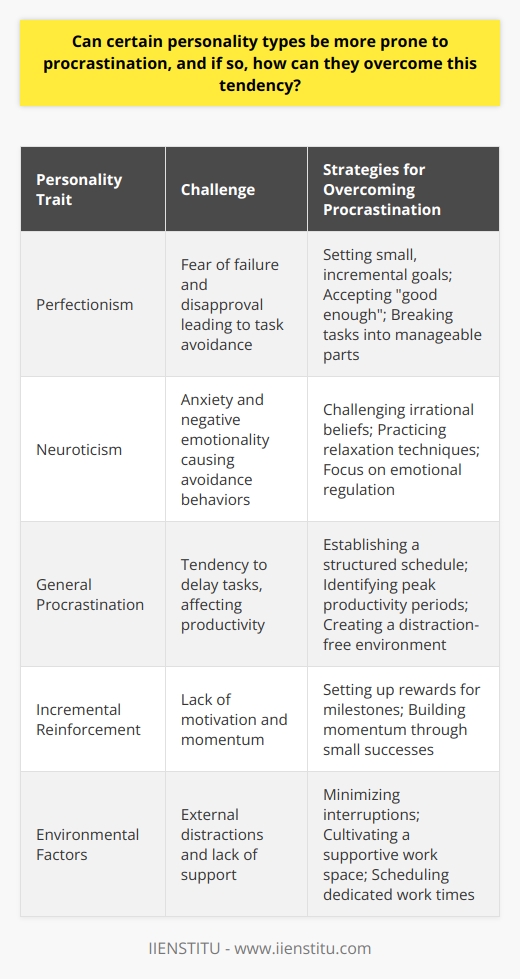
Negative Consequences of Procrastination
Causes of Procrastination
Strategies for Overcoming Procrastination
Reaping the Benefits of Overcoming Procrastination
Procrastination is the act of delaying or postponing an important task or activity. In today's busy world, staying focused on your goals and functions has become increasingly challenging. As a result, we are all tempted to engage in activities far from productive, taking us away from our intended path. Only when our procrastination's long-term consequences become too great do we realize that!
Negative Consequences of Procrastination
When we manage our time efficiently, we stay calm and energized, leading to better performance in our work and school. Conversely, missing deadlines, losing opportunities, and feeling inadequate are all expected consequences of procrastination. In addition, staying up late to finish work causes our physical and mental health to suffer. As a result, we become lazy, prone to illness, and have difficulty focusing. This can, in turn, lead to decreased productivity and a feeling of helplessness.
Causes of Procrastination
Perfectionism is a common cause of procrastination. Wanting to do everything perfectly can be paralyzing, as perfectionists are often unable to take action for fear of failing or not doing something perfectly. Additionally, many of us have an unconscious fear of failure. As a result, we often delay starting something because we are anxious about how it will happen. This keeps us stagnant and prevents us from taking risks and pushing ourselves. Finally, those lacking motivation often need help getting started on a project, leading them to put it off.
Strategies for Overcoming Procrastination
The good news is that overcoming procrastination is possible! Setting realistic and achievable goals, breaking tasks into smaller steps, and pushing through mental barriers are all excellent strategies for conquering procrastination. Breaking an extensive assignment or task into manageable tasks can make it easier to stay focused and motivated. Being conscious of negative thought patterns and pushing back against them can also be beneficial. Lastly, it is helpful to focus on the process of achieving a goal rather than the goal itself.
Reaping the Benefits of Overcoming Procrastination
Once you overcome procrastination, the positive effects will start to be felt. Increased productivity and a sense of accomplishment will be the first benefits that you experience. Then, improved mental and physical health and better focus, organization, and overall well-being will follow. Finally, once you have achieved your goals, you can use your newfound confidence and perspective to continue striving and setting new goals!
Conclusion: Procrastination can be daunting, but it is possible to overcome it. Setting realistic goals, breaking tasks into manageable pieces, and pushing through mental barriers can increase productivity and lead to healthier, more productive lives. With the right strategies and focus, we can combat the adverse effects of procrastination and reap the many benefits of achieving our goals!
Procrastination often leads to missed opportunities and higher costs in the long run.
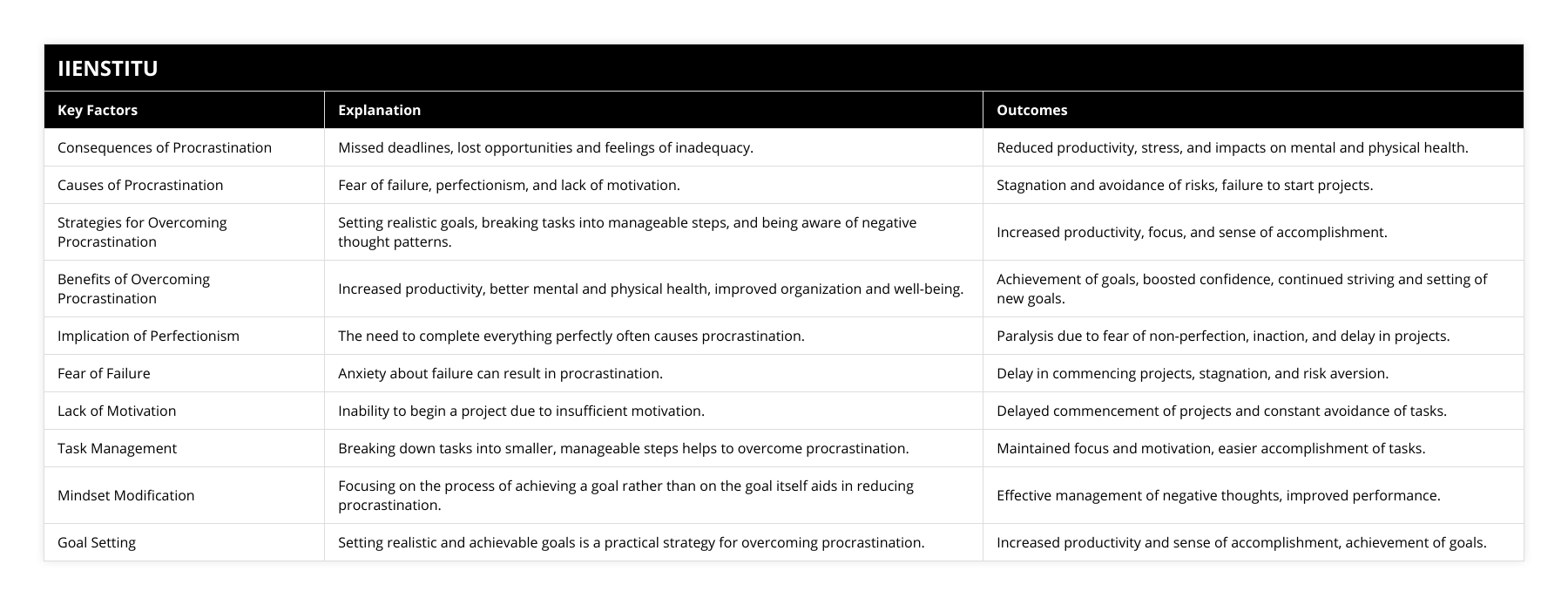
Frequently Asked Questions
What are some of the potential costs of procrastinating?
Procrastination is a behavior that negatively impacts the academic success of individuals. It involves avoiding or delaying unpleasant or difficult tasks to focus on more enjoyable activities. Procrastination is a problem that commonly plagues people of all ages. Still, it is particularly prevalent among students in higher education. Despite the potential for procrastination to negatively affect academic progress, many students persistently postpone tasks, often unaware of the potential costs associated with this behavior. This article will discuss potential costs related to procrastination, focusing on academic performance.
One of the immediate costs of procrastinating is that a student may miss deadlines for important assignments or exams. This can result in the student receiving a lower grade or, in the most severe cases, being expelled from the university. Additionally, suppose students procrastinate by putting off studying. In that case, they may need more time to review important topics before the exam, leading to poor performance. Furthermore, the content taught in a course builds upon prior material. In that case, procrastination can compound recall difficulty, leading to inferior grades.
In addition to the immediate costs of procrastination, long-term costs can detrimentally affect a student’s professional success. For instance, if a student delays the completion of assignments throughout their program, they may be unprepared for the expectations they face in the professional environment after graduating. This could have a significant impact on their future job prospects and opportunities. Additionally, students who procrastinate may find developing practical learning and working habits challenging, making them less efficient employees.
Procrastination has the potential to result in numerous costs for students. Sometimes, these costs may be immediate and tangible, such as missing an exam, or long-term, such as a lack of preparedness for the professional environment. This highlights the importance of taking a proactive approach to academic tasks and attempting to prevent the need for procrastination.
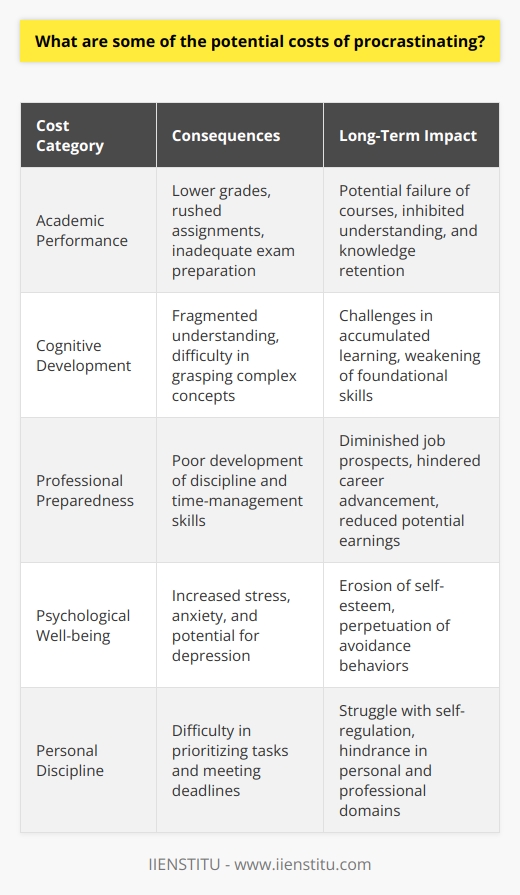
What techniques can I use to manage procrastination effectively?
Procrastination is an issue faced by almost everyone. It is common to be tempted to procrastinate when faced with a task that one finds difficult or overwhelming. Unfortunately, the adverse effects of procrastination can be severe, leading to incomplete assignments, missed deadlines, and poor mental health. Fortunately, there are several evidence-based techniques available for managing procrastination. Here we will discuss three strategies: goal setting, time management, and cognitive restructuring.
The first step in combating procrastination is to decide on one's goal. This could be a predetermined goal or simply the intention to manage procrastination. A clear, achievable goal can empower individuals to set possible milestones and tasks. Planning work days and breaking down tasks into negotiable chunks can make the studies seem more attainable and build momentum to keep people working and motivated.
Time management is essential in managing procrastination. Allocating sufficient time to complete tasks can help combat the common cause of procrastination: feeling overwhelmed by the amount of work. Rigorously scheduling blocks of time to work on assignments can also reduce the temptation to procrastinate. This includes creating a suitable working environment and developing a strict daily plan that avoids distraction.
Finally, it is essential to understand the causes of procrastination. Cognitive restructuring is a technique used to address the psychological factors behind procrastination, such as self-doubt and perfectionism. This can involve understanding underlying negative thoughts and replacing these cognitions with more positive and realistic ones. This can help individuals to combat procrastination over the long term.
In conclusion, procrastination is a pervasive issue that can have severe consequences. Goal setting, time management, and cognitive restructuring are three evidence-based techniques that can be used to manage procrastination effectively. Implementing these strategies can enable individuals to reduce procrastination and lead more productive and meaningful lives.
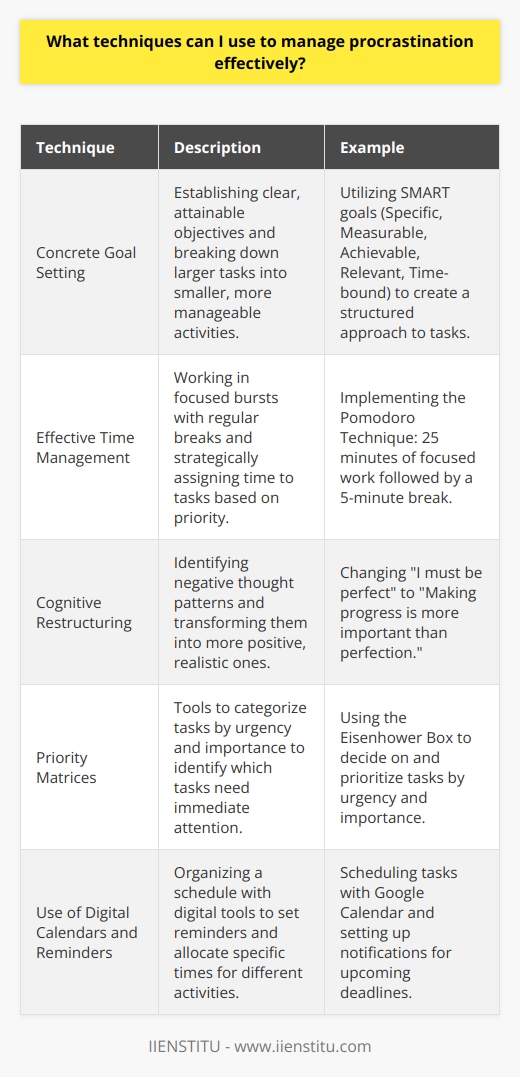
What strategies can I use to motivate myself to complete tasks on time?
Motivation to complete tasks on time is one of the most critical factors for success. Meeting deadlines, both short-term and long-term, can make a dramatic improvement in the quality of your work, as well as increase overall productivity and efficiency. However, staying motivated can be challenging, especially when dealing with tasks that need more objectives or interest or when facing a daunting deadline day. Here are some strategies to help you stay motivated and complete tasks on time.
Creating A Clear Goal
Setting a clear goal will give you a purpose for completing the task. Next, consider your more extensive plan, and take a few moments to think about why it is essential to get the job done and how it will help you succeed. This process helps establish a goal that is both achievable and meaningful.
Focus On Short-Term Goals
Focusing on short-term goals can help break an enormous task into smaller, more manageable chunks. This will make it easier to stay motivated and organized while working on the job. In addition, dedicating a certain amount of time to completing the task, such as 30 minutes daily, will maximize productivity and meet the project deadline.
Reward Yourself
Set up rewards along the way to keep yourself motivated and on track. For example, ensure that the tip is something you enjoy, such as going out to eat or taking a break to relax and watch a movie. This will help keep you motivated and on track to complete the task on time.
Make Time For Breaks
Taking a break is a great way to re-energize and refocus. Taking a break will help you stay focused and productive for the rest of the task. In addition, holidays allow you to clear your mind and approach the job differently.
Stay Organized
The organization is the key to success. Staying organized will help you manage tasks and prioritize first. This will make it easier to stay motivated and complete tasks on time.
Implementing these strategies lets you stay motivated and complete tasks on time. Doing so will enable you to be more productive and efficient. Additionally, focusing on meeting deadlines will help you accomplish your goals and reach tremendous success.

What are the negative effects of procrastination on an individual's mental health?
Impacts on Mental Health
Procrastination, the act of delaying or postponing tasks, manifests adverse effects on an individual's mental health. Primarily, it leads to an increase in stress levels. When a person defers tasks, they create a backlog of work, resulting in immense pressure to fulfill numerous obligations within limited time constraints. Consequently, the build-up of apprehension and anxiety becomes detrimental to their emotional well-being.
Self-Esteem and Mood
Persistent procrastination not only elevates stress but also negatively impacts an individual's self-esteem and mood. Procrastination fuels feelings of inadequacy, disappointment, and guilt due to the individual's failure to complete tasks in a timely manner. The procrastinator's diminished self-worth and recurrent negative emotions can subsequently lead to depressive symptoms or exacerbate pre-existing depressive conditions.
Cognitive Functioning
In addition to emotional turmoil, procrastination poses deleterious consequences on cognitive functioning. As heightened stress and anxiety disrupt the brain's executive functions, the individual's cognitive abilities, such as decision making, problem-solving, and attention, become impaired. This impaired cognitive functioning can form a vicious cycle where procrastination hinders an individual's capacity to undertake tasks efficiently, further exacerbating the tendency to delay tasks.
Coping Mechanisms
As a maladaptive response to stress, procrastination serves as an avoidance strategy that perpetuates unhealthy coping mechanisms. By evading tasks, the individual momentarily alleviates anxiety, reinforcing this unproductive behavior in future situations. Relying on procrastination as a primary method of coping fosters habitual escapism, potentially leading to more destructive behaviors or addiction over time.
In summary, procrastination poses significant threats to an individual's mental health as it escalates stress, diminishes self-esteem and mood, impairs cognitive functioning, and promotes detrimental coping mechanisms. Therefore, addressing the underlying causes and targeted interventions against procrastination are essential to mitigate its adverse effects on mental well-being.
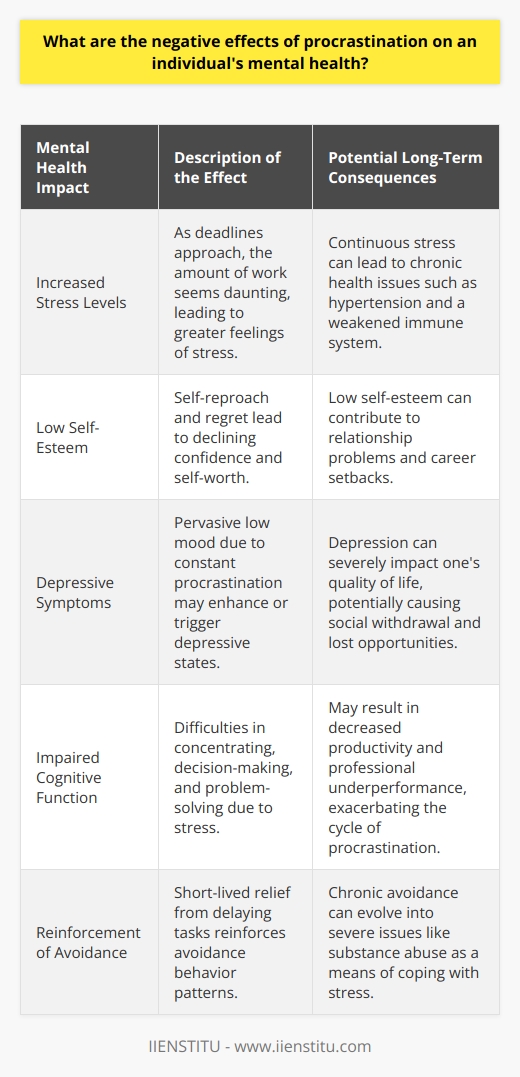
In what ways might procrastination impact professional and personal relationships?
Impact on Professional Relationships
Procrastination can adversely affect professional relationships in several ways. First, repeatedly delaying tasks can result in missed deadlines, leading to colleagues mistrusting the procrastinator's ability to meet commitments. This lack of trust may prevent coworkers from relying on the procrastinator for important projects, hindering collaboration and teamwork. Additionally, the inability to prioritize effectively can also create a perception of unreliability, which damages professional reputation and career growth.
Impaired Performance and Increased Stress
Moreover, procrastination can impact the quality of one's work. By delaying tasks, an individual may be forced to rush through assignments or produce subpar results due to insufficient time allotted for completion. This impaired performance can strain professional relationships as coworkers and supervisors may judge the procrastinator as being lazy or incompetent. Furthermore, putting off tasks can increase stress levels, which can negatively influence one's ability to communicate effectively, leading to misunderstandings and conflicts within the workplace.
Effects on Personal Relationships
Procrastination can also disturb personal relationships. For instance, delaying important decisions or tasks in one's personal life, such as discussing conflict or expressing emotions, can lead to miscommunication, unresolved issues, and dissatisfaction within the relationship. In turn, the other party may begin to perceive the procrastinator as unreliable or uninterested, which can undermine the foundation of trust and intimacy, ultimately putting the relationship at risk.
Inability to Achieve Balance
Lastly, the impact of procrastination on professional and personal relationships can be exacerbated by the inability to achieve a healthy work-life balance. The combination of missed deadlines, unsatisfactory performance, and strained relationships may invade one's personal life, causing emotional distress and discontent. As a result, the procrastinator's overall well-being can be negatively affected, further impairing their ability to establish and maintain healthy relationships.
Conclusion
In summary, procrastination can inflict substantial harm on both professional and personal relationships by generating mistrust, impairing performance, and disrupting effective communication. Moreover, the consequences of procrastination can lead to an unhealthy work-life balance, increasing stress and interfering with one's overall well-being. Therefore, addressing procrastination and developing time management skills are essential in fostering solid relationships and achieving a balanced, fulfilling life.
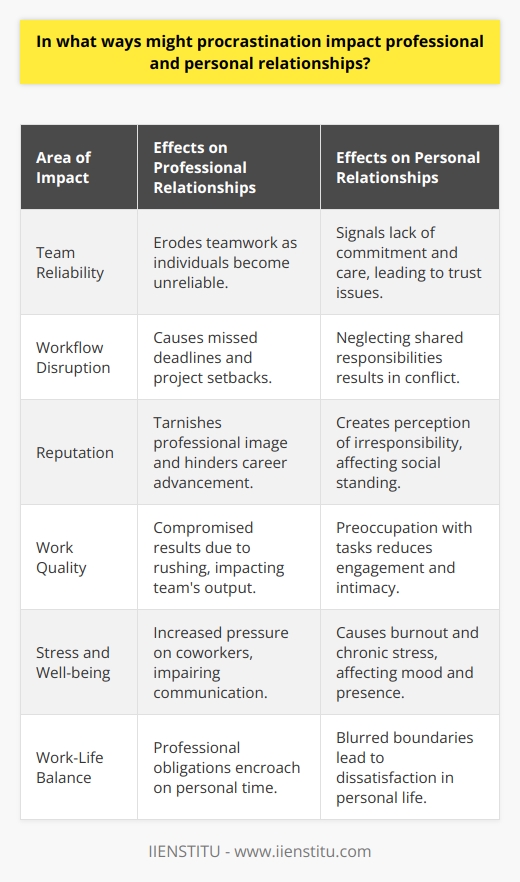
How does the perceived loss of productivity to procrastination vary across different industries and job roles?
Variations Across Industries
Varying degrees of perceived loss of productivity due to procrastination can be observed across different industries. For instance, professionals in the information technology industry may experience higher perceived productivity loss to procrastination due to the time-sensitive nature of their tasks. Conversely, the creative industry may observe lower perceived loss, as procrastination could foster innovative ideas through idle thinking.
Impact of Job Roles
The perceived loss to productivity as a result of procrastination may also shift depending on an individual's role within an organization. Those working in managerial positions typically confront higher levels of stress due to greater responsibilities, making procrastination detrimental to their productivity and timely decision-making. On the other hand, employees functioning in roles with less responsibility may not experience the same detrimental effects of procrastination, as it may not significantly impact their workflow.
Personality Traits and Procrastination
It is essential to consider the unique personality traits of each individual, as the perception of productivity loss due to procrastination may vary depending on one's inherent tendencies. Highly organized individuals may feel a substantial decrease in productivity while procrastinating, whereas others who typically perform tasks in a chaotic or last-minute fashion may not feel this loss as acutely or may have developed coping mechanisms.
Effectiveness of Procrastination
Procrastination's effectiveness varies across industries and job roles, often depending on the perceived time available and the nature of tasks. For instance, strategic procrastination in decision-making roles could lead to more calculated choices, while habitual procrastination may lead to missed deadlines and a deterioration of work relationships. In creative roles, periods of procrastination could stimulate higher levels of creativity and improve one's work.
In conclusion, the perceived loss of productivity to procrastination varies significantly across industries and job roles due to factors such as the time-sensitive nature of tasks, the level of responsibility, individual personality traits, and the particular tasks being undertaken. It is essential to consider this variation when examining the impact of procrastination in the workplace, acknowledging that context-specific approaches may be required to address the issue effectively.
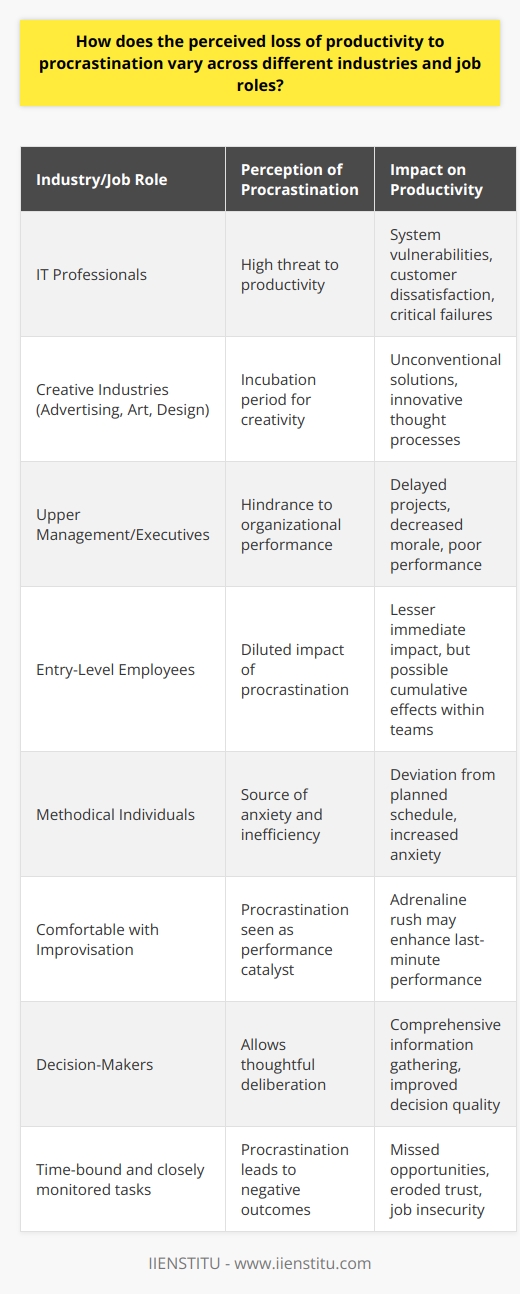
What are the psychological factors that contribute to procrastination?
Psychological factors
Several psychological factors contribute to procrastination, a behavior marked by the intentional delay or postponement of tasks despite negative consequences. Understanding these factors can help individuals overcome procrastination and increase productivity.
Fear of failure
One of the most significant factors is the fear of failure, which can manifest as self-doubt and anxiety. Such fear often stems from unrealistic expectations and the belief that we must be flawless or infallible. When faced with challenging tasks, these feelings can lead to avoidance as a defensive mechanism to protect our self-esteem.
Poor self-regulation
Another factor contributing to procrastination is poor self-regulation, which refers to the ability to manage one's thoughts, emotions, and actions. People may struggle to suppress impulses, adhere to deadlines, or maintain focus on tasks, leading to ineffective time management. This inability to self-regulate can result in a failure to complete tasks or allocate sufficient time for work, resulting in postponement.
Perfectionism
Perfectionism is also linked to procrastination. People with high levels of perfectionism may set excessively high standards for themselves, leading to fear of not meeting these expectations. This fear can cause the individual to hesitate or avoid engaging with tasks because the possibility of disappointment feels too overwhelming.
Lack of motivation
Procrastination may occur when an individual lacks motivation or finds tasks uninteresting. Intrinsic motivation, stemming from a genuine interest or enjoyment in an activity, may be lacking, leading to ineffective efforts at task completion. Additionally, extrinsic motivators such as grades, rewards, or the approval of others may not always be present, effective, or compelling enough to encourage action.
Low self-efficacy
A person's self-efficacy, or belief in their ability to complete a task, impacts their propensity to procrastinate. Low self-efficacy can foster a sense of inadequacy, leading individuals to doubt their abilities and avoid tasks they perceive as difficult or challenging. Enhancing self-efficacy may promote a proactive approach and more active engagement with tasks, mitigating procrastination.
In conclusion, numerous psychological factors contribute to procrastination, including fear of failure, poor self-regulation, perfectionism, lack of motivation, and low self-efficacy. Recognizing these factors and addressing them can aid individuals in overcoming procrastination and improving productivity.
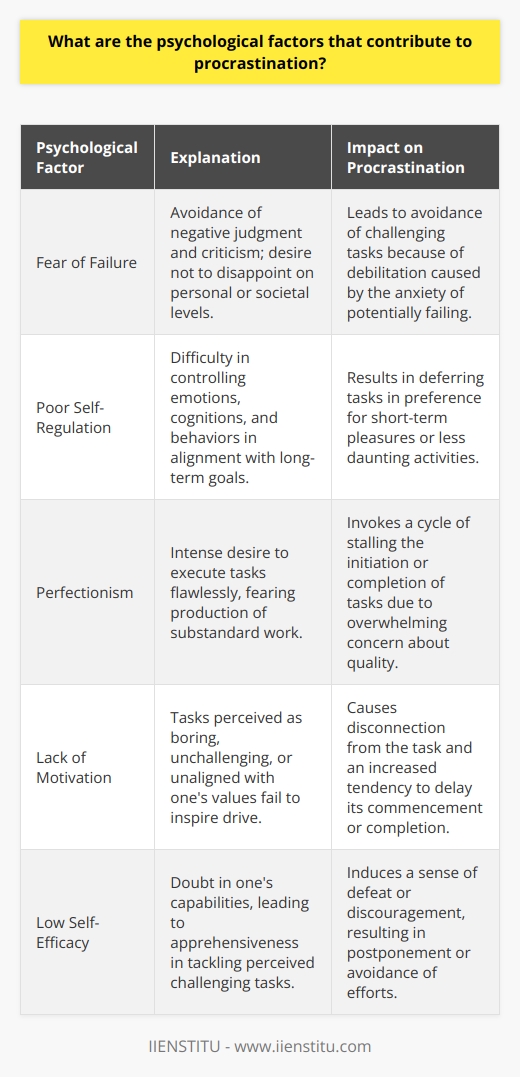
How can the implementation of time management strategies reduce the likelihood of procrastination?
**Time Management Strategies**
Implementing effective time management strategies can significantly reduce the incidence of procrastination. These strategies help individuals better organize their tasks, set realistic goals, and optimize productivity, ultimately promoting timely task completion.
**Task Prioritization**
One essential time management strategy is prioritizing tasks based on their importance and deadlines. By having a clear understanding of which tasks require immediate attention, individuals can avoid wasting time on less urgent matters. Consequently, they are more likely to complete crucial tasks promptly.
**Goal Setting**
Setting achievable, short-term goals is another vital method to decrease procrastination. When individuals break down larger tasks into smaller, manageable steps, they tend to feel less overwhelmed. As a result, they are more motivated to initiate the required actions and complete tasks in a timely manner.
**Scheduled Work Sessions**
Scheduling specific time blocks for work or study can also minimize procrastination. By establishing a dedicated timetable, individuals create a sense of routine and structure. This regimen helps them stay on track and avoid the distractions that often lead to procrastination.
**Effective Breaks**
Incorporating regular breaks into one's routine is another time management strategy that can help counter procrastination. Taking brief, planned breaks allows individuals to rejuvenate mentally and physically, permitting them to return to their tasks with renewed focus and energy.
**Accountability Measures**
Finally, utilizing accountability measures can further deter procrastination. One example is having study or work partners. Sharing progress with others creates a sense of responsibility, motivating individuals to stay on task and complete their assignments as scheduled.
In conclusion, the implementation of time management strategies, including task prioritization, goal setting, scheduled work sessions, effective breaks, and accountability measures, can greatly reduce the likelihood of procrastination. By fostering a more organized and efficient approach to work, these methods empower individuals to complete tasks promptly and avoid the pitfalls of procrastination.
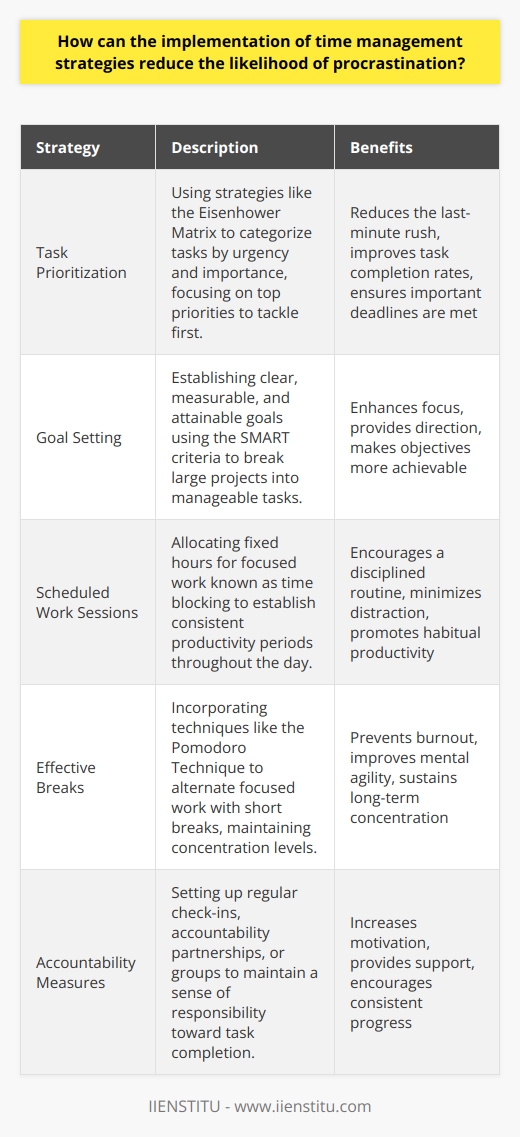
Are there any positive aspects of procrastination, or should it always be considered detrimental to productivity?
Positive Aspects of Procrastination
Contrary to popular belief, procrastination can yield positive aspects in certain cases, enhancing productivity and creativity. One case is when an individual partakes in the practice of active procrastination, which involves deliberating on a task and intentionally postponing it with the knowledge that a deadline is looming. This motivates the individual to work more efficiently and effectively under pressure.
Role of Incubation Periods
During procrastination, the mind unconsciously processes information and generates new ideas, allowing an individual's thoughts to incubate. This incubation period can lead to better decision-making when the task is eventually tackled, where the individual has had ample time to consider various angles and explore multiple solutions before starting.
Mental Break Benefits
Procrastination can also grant mental breaks that rejuvenate an individual, enhancing overall productivity when work resumes. By briefly engaging in enjoyable activities or merely allowing the mind to wander, one can reduce stress and recharge cognitive faculties, making it easier to maintain focus and concentrate on the task at hand.
Thresholds for Procrastination
However, it is essential to recognize the thresholds for procrastination, as excessive delays can result in detrimental effects on productivity. While active procrastination may be beneficial for some tasks, chronic procrastination can hinder performance. It is crucial to strike a balance between healthy, intentional breaks and excessive avoidance.
In conclusion, procrastination does not always equate to diminished productivity. In certain cases, actively procrastinating tasks, experiencing incubation periods, and taking mental breaks can lead to increased efficiency, improved decision-making, and ultimately, enhanced productivity. While it is important to avoid chronic procrastination, recognizing the benefits of intentional breaks can foster a more well-rounded approach to work and personal growth.
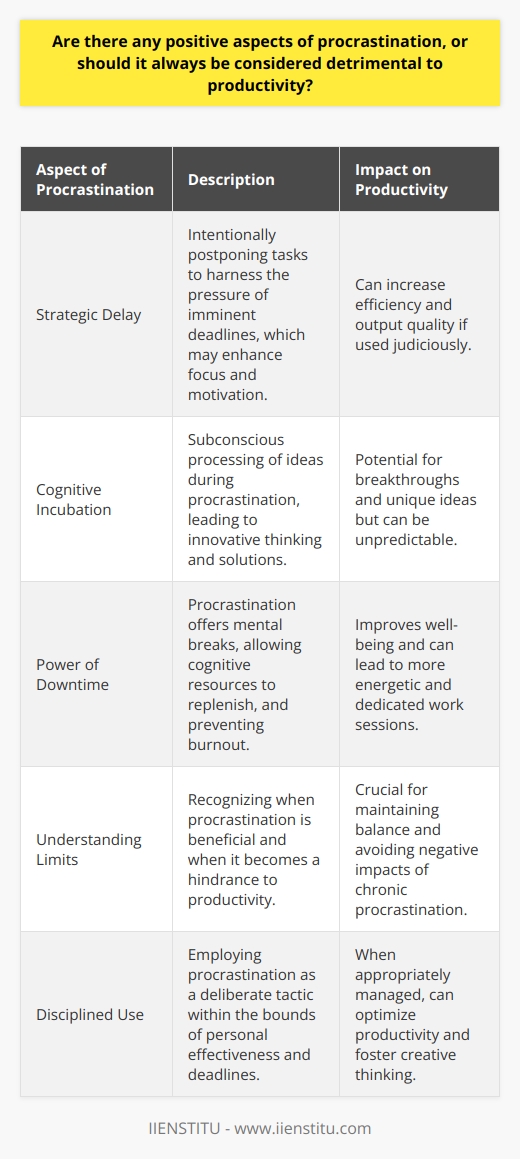
What are the long-term impacts of habitual procrastination on an individual's career development?
Career Performance Decline
Long-term impacts of habitual procrastination on an individual's career development are profound. They result in a significant decline in career performance. Regular postponement of tasks often leads to inefficiencies. These inefficiencies result in poor quality of work, causing a dip in performance ratings.
Missed Opportunities
Habitual procrastination prevents individuals from reaching their full potential. They miss opportunities because they postpone decision-making or taking action. These missed opportunities, over time, can significantly impact career development.
Slow Professional Growth
An individual who habitually procrastinates is often seen as unreliable. Thus, they are less likely to be given responsibilities or promoted. This reduces their chances of climbing the professional ladder, translating to slow professional growth.
Stress and Burnout
Procrastination often results in stress and burnout as tasks pile up. This can affect an individual's mental health, leading to a decline in work efficiency. Over time, this might diminish their enthusiasm for work and harm career development.
Stagnant Skill Development
Finally, habitual procrastination can lead to stagnant skill development. When individuals procrastinate, they spend less time learning new skills or honing existing ones. This lack of skill development over time could limit career progression.
In conclusion, the long-term impact of habitual procrastination is damaging to career development. It leads to decline in performance, missed opportunities, slow growth, increased stress, and stagnant skill development. Thus, overcoming procrastination is essential for successful career development.
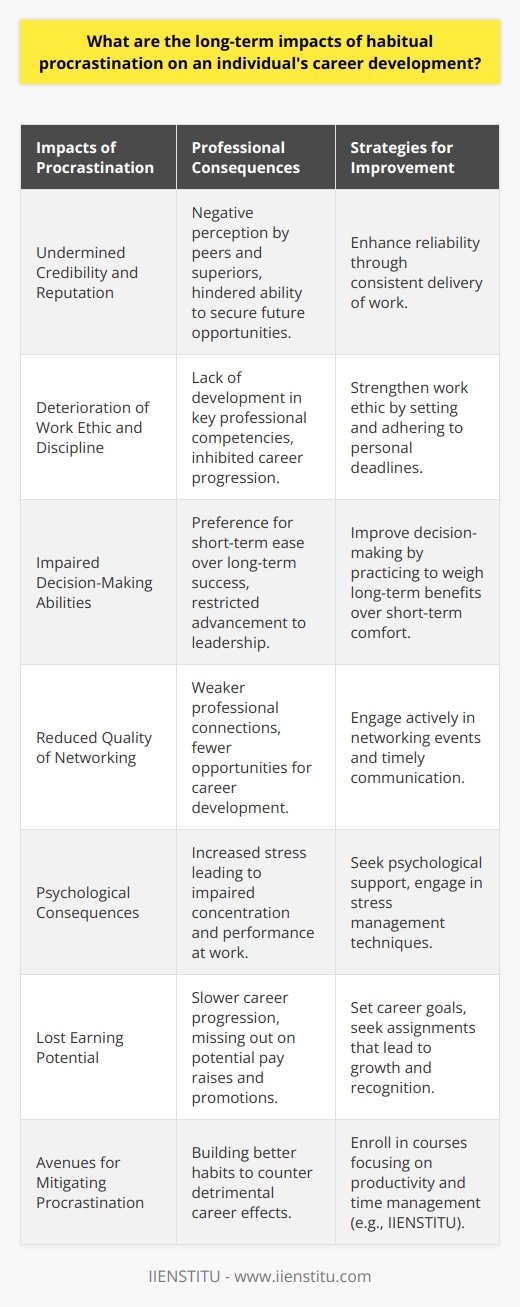
How do cultural and societal factors influence an individual's tendency to procrastinate?
Cultural Influence on Procrastination
Different cultures perceive and prioritize time differently, which can influence procrastination. For instance, polychronic cultures, where people handle multiple tasks concurrently, may view procrastination less negatively than monochronic cultures that emphasize punctuality and strict scheduling. Someone from a polychronic culture might delay tasks without any guilt or stress, whereas in monochronic cultures, this could lead to anxiety and perceived laziness.
Influence of Societal Expectations
Societal expectations and norms also impact procrastination. Societies with high achievement expectations can lead individuals to procrastinate due to fear of failure or perfectionism. Conversely, societies that foster collaborative and leisurely lifestyles might encourage a more relaxed attitude towards time management and deadlines, thus fostering procrastination. In such societies, procrastination may not entail as many negative consequences as in more performance-oriented societies.
Role of Upbringing and Education
An individual's upbringing and educational background also play a key role. If procrastination becomes habitual in childhood or adolescence due to lack of discipline or structure, it may persist into adulthood. Similarly, an educational environment that emphasizes constant competition and performance may induce procrastination as a stress avoidance tactic.
In conclusion, both cultural and societal factors significantly influence an individual's tendency to procrastinate. Understanding these influences can lead to more effective strategies for managing procrastination. Thus, societies, educations systems, and individuals must consider these aspects when addressing procrastination.
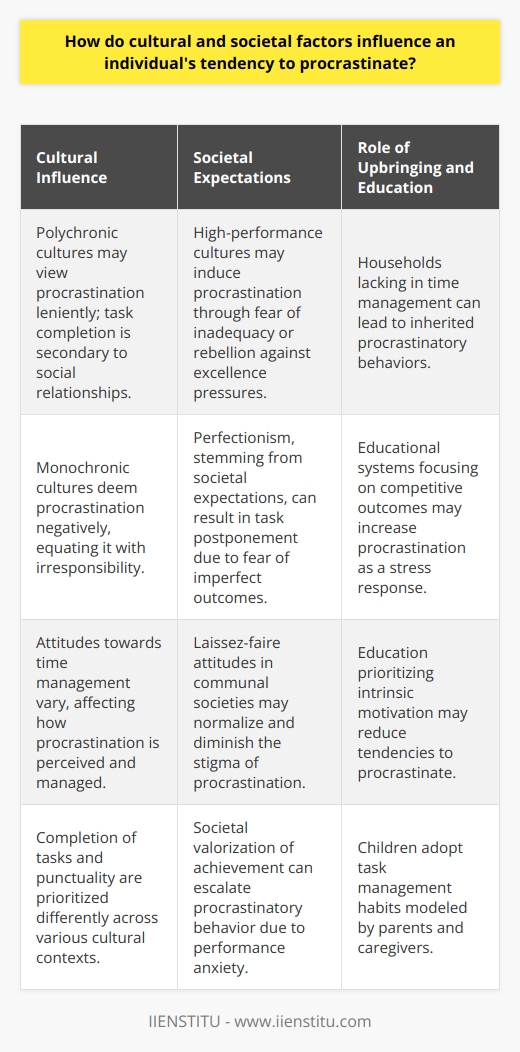
Can certain personality types be more prone to procrastination, and if so, how can they overcome this tendency?
Personality Types and Procrastination
Research suggests certain personality types may indeed be more prone to procrastination. Specifically, individuals exhibiting characteristics of perfectionism or neuroticism often procrastinate more.
Perfectionist Procrastinators
Perfectionists fear criticism and making mistakes. They delay tasks to avoid potential errors. Self-awareness and cognitive-behavioral techniques can help perfectionists. These methods promote understanding of their tendencies and offer practical strategies to handle tasks directly.
Neurotic Procrastinators
Neurotic individuals tend to be anxious and self-conscious. They delay actions due to their overpowering worries and insecurities. They can overcome this procrastination through emotion-focused coping strategies. Approaches like mindfulness and stress management can anchor them in the present and reduce their anxiety.
Personality-Driven Interventions
Personality-based interventions may improve productivity in procrastinators. Identifying one's personality type and triggers can lead to effective strategies. For example, perfectionists could set realistic standards and deadlines. Meanwhile, neurotic individuals can engage in regular physical activity or use relaxation techniques to manage their anxiety.
Transforming Behavior
Regardless of their personality types, individuals can train themselves to overcome procrastination. They can start by recognizing their procrastination patterns. Then, employing time management techniques, setting achievable goals, and finding personal motivation can aid in transforming their behavior.
In sum, the tendency to procrastinate is not immutable and can be modified by using strategies tailored to one's personality. This approach involves understanding one's unique triggers for procrastination and adopting specific techniques to manage and transform this behavior. By doing so, even the most chronic procrastinators can enhance their efficiency and productivity.
